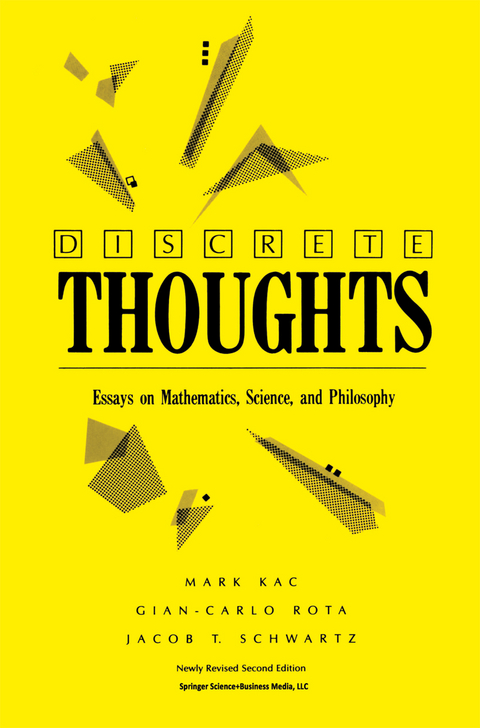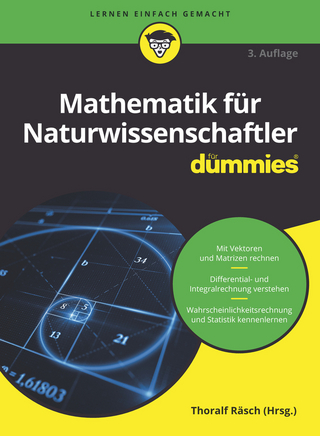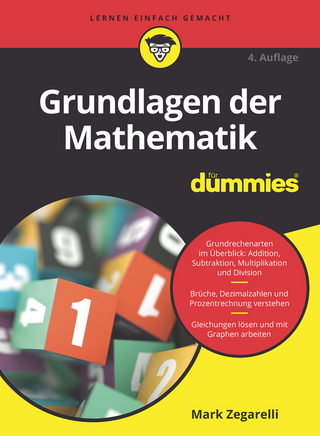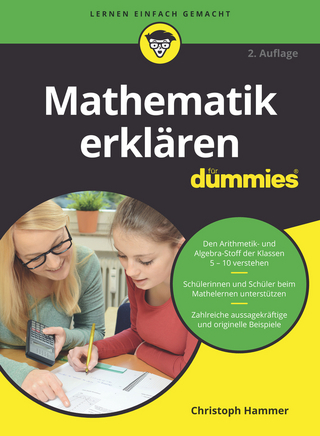
Discrete Thoughts
Essays on Mathematics, Science and Philosophy
Seiten
1993
|
2nd ed. 1992
Birkhauser Boston Inc (Verlag)
978-0-8176-3636-4 (ISBN)
Birkhauser Boston Inc (Verlag)
978-0-8176-3636-4 (ISBN)
as anywhere today, it is becoming more d- ficult to tell the truth. Jos6 Ortega y Gasset, in an adm- able lesson summarized by Antonio Machado's three-line poem, prophetically warned us that the reason people so often lie is that they lack imagination: they don't realize that the truth, too, is a matter of invention.
as anywhere today, it is becoming more d- ficult to tell the truth. To be sure, our store of accurate facts is more plentiful now than it has ever been, and the minutest details of history are being thoroughly recorded. Scientists, - men and scholars vie with each other in publishing excruciatingly definitive accounts of all that happens on the natural, political and historical scenes. Unfortunately, telling the truth is not quite the same thing as reciting a rosary of facts. Jos6 Ortega y Gasset, in an adm- able lesson summarized by Antonio Machado's three-line poem, prophetically warned us that the reason people so often lie is that they lack imagination: they don't realize that the truth, too, is a matter of invention. Sometime, in a future that is knocking at our door, we shall have to retrain ourselves or our children to properly tell the truth. The exercise will be particularly painful in mathematics. The enrapturing discoveries of our field systematically conceal, like footprints erased in the sand, the analogical train of thought that is the authentic life of mathematics. Shocking as it may be to a conservative logician, the day will come when currently MATHEMATICS, IN vague concepts such as motivation and purpose will be made formal and accepted as constituents of a revamped logic, where they will at last be allotted the equal status they deserve, si- by-side with axioms and theorems.
as anywhere today, it is becoming more d- ficult to tell the truth. To be sure, our store of accurate facts is more plentiful now than it has ever been, and the minutest details of history are being thoroughly recorded. Scientists, - men and scholars vie with each other in publishing excruciatingly definitive accounts of all that happens on the natural, political and historical scenes. Unfortunately, telling the truth is not quite the same thing as reciting a rosary of facts. Jos6 Ortega y Gasset, in an adm- able lesson summarized by Antonio Machado's three-line poem, prophetically warned us that the reason people so often lie is that they lack imagination: they don't realize that the truth, too, is a matter of invention. Sometime, in a future that is knocking at our door, we shall have to retrain ourselves or our children to properly tell the truth. The exercise will be particularly painful in mathematics. The enrapturing discoveries of our field systematically conceal, like footprints erased in the sand, the analogical train of thought that is the authentic life of mathematics. Shocking as it may be to a conservative logician, the day will come when currently MATHEMATICS, IN vague concepts such as motivation and purpose will be made formal and accepted as constituents of a revamped logic, where they will at last be allotted the equal status they deserve, si- by-side with axioms and theorems.
Discrete Thoughts.- Discrete Thoughts.- I.- Mathematics: Tensions.- The Pernicious Influence of Mathematics on Science.- Statistics.- Statistics and Its History.- Combinatorics.- Computer Science.- Mathematics: Trends.- The Future of Computer Science.- Economics, Mathematical and Empirical.- II.- Complicating Mathematics.- Mathematics and Its History.- Academic Responsibility.- Husserl and the Reform of Logic.- Husserl.- Artificial Intelligence.- Computing and Its History.- Will Computers Replace Humans?.- Computer-Aided Instruction.- Misreading the History of Mathematics.- The Wonderful World of Uncle Stan.- Ulam.- Kant.- Heidegger.- Doing Away with Science.- More Discrete Thoughts.
| Erscheint lt. Verlag | 1.6.1993 |
|---|---|
| Zusatzinfo | XII, 266 p. |
| Verlagsort | Secaucus |
| Sprache | englisch |
| Maße | 155 x 235 mm |
| Themenwelt | Mathematik / Informatik ► Mathematik ► Allgemeines / Lexika |
| Mathematik / Informatik ► Mathematik ► Geschichte der Mathematik | |
| ISBN-10 | 0-8176-3636-6 / 0817636366 |
| ISBN-13 | 978-0-8176-3636-4 / 9780817636364 |
| Zustand | Neuware |
| Haben Sie eine Frage zum Produkt? |
Mehr entdecken
aus dem Bereich
aus dem Bereich


